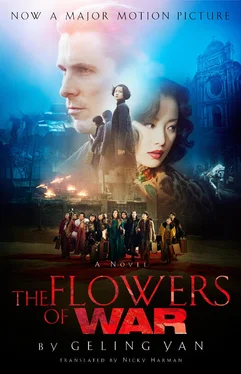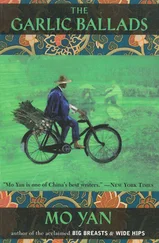‘Thank you,’ said Father Engelmann perfunctorily, ‘and now could you ask your soldiers to get back down off the wall?’
‘Father, open the door please.’ The request was relayed with unimpeachable courtesy.
‘What difference does it make whether I open it or not?’
‘You’re quite right, Father, it makes no difference at all. So why not show some good manners?’ said the interpreter.
Father Engelmann shook his head and led Fabio away.
‘Father, it is not wise to offend guests like us,’ said the interpreter gently to their retreating backs.
‘I used to think that too,’ said the priest, looking back at the closed door. ‘But then I realised that, whether or not I offend you, it makes no difference to the result.’
‘Don’t make things worse than they already are,’ Fabio muttered.
‘Can things get any worse?’ said Father Engelmann. There was no way he was going to let these mad dogs in yellow uniforms through the door. To do that would be to elevate them to the status of human beings.
He turned back, to see Japanese soldiers pouring over the wall and into the courtyard. Some of them grabbed an axe and smashed the lock on the entrance door. The officer marched in at the head of another dozen soldiers, who looked as if they were taking over the church.
‘Who are you looking for now?’ asked Father Engelmann.
There was another bow from the officer. These Japanese certainly were punctiliously polite. ‘Father,’ the interpreter addressed them ceremoniously, ‘please believe that we are making this visit entirely in good faith.’ The slightly pained words in English were mimicked by a pained expression on the face of the officer. ‘We do so hope that it will make up for any past disagreements between us.’
Father Engelmann gave a very slight smile. There was a glacial look in his deep-set, grey-blue eyes.
‘All right. I accept your apology, and your Christmas greetings. Now, let me remind you, that is the exit,’ and he turned to show his visitors out.
‘Stand still!’ shouted the officer. Up till now, he had played dumb and allowed the interpreter to relay his words, but now they burst from him in English.
Father Engelmann stood still but did not turn round. His hunched shoulders expressed resignation.
The officer said something in a fierce undertone to the interpreter, who turned to the priest and said ingratiatingly, ‘But we have not started our Christmas celebrations yet!’
Father Engelmann looked at the officer and then around him at the dozens of torches which lit up the courtyard. Behind the torch beams, the outlines of dark figures could be seen.
The officer spoke again. ‘Our HQ wants to hold a Christmas party and I have been ordered to invite a few honoured guests.’ He turned to a soldier carrying an attaché case and took from him a large envelope with ‘Invitation’ handsomely printed on it in Chinese.
‘This is very kind of you but I cannot accept any invitation,’ responded the priest. He made no move to take the proffered envelope, and it hung awkwardly between them.
‘You’ve misunderstood, Father,’ said the officer. ‘This invitation is not for you.’
Father Engelmann looked up at the deferentially bowed head of the other. As he grabbed the envelope and opened it, a terrible premonition assailed him. The slight tremor which had started to afflict his hands turned into an uncontrollable shake. The officer told a soldier to shine his torch on the letter. It was addressed to the girls of the church choir.
‘We have no choir here,’ said Father Engelmann.
‘Do not forget, Father, that yesterday you told us there were no Chinese soldiers here either.’
Fabio snatched the invitation from the older priest’s hand and ran his eyes over it. Then, ashen-faced, he turned to the officer. ‘Did we not tell you that the St Mary Magdalene schoolgirls had all been taken home by their parents?’
‘We have looked into the history of the famous St Mary Magdalene Missionary School. A small number of the girls are orphans.’ The interpreter civilly translated the officer’s words as if they were all having a perfectly rational discussion.
‘They were taken away by the teachers when they left,’ said Fabio.
‘No. We have accurate intelligence that they have been heard singing hymns. The Japanese Imperial Army has many good friends among the Chinese. Please don’t imagine that you can pull the wool over our eyes.’
Father Engelmann was lost in thought, as if the wrangling between Fabio and the officer were of no interest to him and he had more important things to think about. Who had passed on this deadly intelligence? Maybe the informant really believed that the Japanese wanted to repent of their sins, and hear the girls sing hymns. There actually were some Christians, both Protestant and Catholic, among the Japanese troops. Perhaps whoever had betrayed the girls had no idea just how sunk in depravity the Japanese soldiers were. In the Safety Zone people had talked of how the Japanese soldiers believed that young virgins had restorative powers, and collected their pubic hair which they hung around their neck to ward off evil. They even thought that virgin girls could protect them from a hail of bullets in battle.
Father Engelmann was lost in his musings. Then he pulled himself together to see Fabio bodily trying to block the soldiers’ way.
‘You have no right to search here!’ Fabio shouted. ‘If you do, it’ll be over my dead body!’
He sounded is if he were ready to be martyred.
Behind the torches there was a slight sound, as a hundred soldiers drew their swords and guns and stood ready for battle.
Father Engelmann sighed. He walked up to the Japanese officer. ‘They’re only just into their teens,’ he said. ‘They’ve led sheltered lives, and they’ve never had any contact with men, let alone soldiers…’
In the darkness, a smile could be seen on the officer’s face.
‘Please don’t worry, Father,’ he said. ‘On the honour of the Japanese Imperial Army, I promise you that when they have finished singing, I will personally bring them back to the church.’
‘Father, how can you possibly believe this nonsense?’ said Fabio, lapsing into Yangzhou dialect in his agitation. ‘I won’t let them do those bestial things!’
‘… and they cannot accept your invitation,’ Father Engelmann went on.
‘This will be a very important event for them,’ said the officer. ‘There will be flowers and good food and music … I do not think they would be so foolish as to reject our kindness. That might lead to an unhappy outcome.’
‘Officer, this is all too sudden. The children have not had time to prepare themselves. At the very least, they need to have a wash and put on their choir robes. And I need time too, to explain to them what is going to happen and to reassure them there is no need to be afraid. You’re the enemy to them. They’ll be terrified at the idea of going away with enemy soldiers. In extreme cases, some of them may try to harm or even kill themselves, with terrible consequences.’
Here Father Engelmann gave full rein to his famous eloquence.
‘Do you really think these animals want to listen to hymns?’ Fabio said to him.
‘Father, how long do you think the girls need to get ready?’ the officer asked through the interpreter.
‘Three hours should be enough.’
‘No, no, I can only allow them one hour.’
‘Two, at least!’
‘No!’
‘Two hours is the absolute minimum. You don’t want to take a bunch of half-starved, bedraggled, terrified girls with you, do you? Don’t you want them to be clean and neat, and willing? I need time to persuade them that you will not harm them.’
Читать дальше












